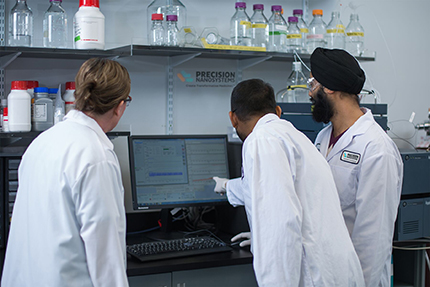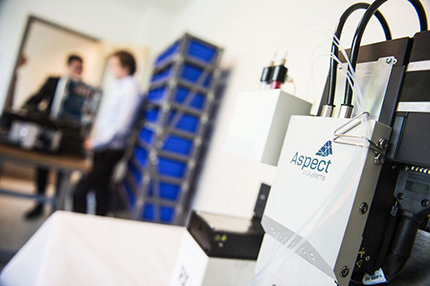Spotlight on Canadian innovators in life sciences

Zilia
Early diagnosis of eye conditions has a significant impact on treatment outcomes, health care costs and quality of life. Quebec‑based medtech company Zilia has found a way to track and measure oxygen saturation in the eye to detect conditions before irreparable damage occurs.
The company has integrated imaging, spectrometry and artificial intelligence (AI) to develop its proprietary technology, Zilia Ocular. This first‑of‑its‑kind ocular oximeter is non‑invasive and provides full light spectrum analysis in real time.
Having launched its first product in May 2019, the company has set its sights high. “We’re looking to build something massive. And since the eye is a unique window into someone’s health, we have an opportunity to become a well‑renowned company in eye care, and even neurology and cardiology,”
says Dr Patrick Sauvageau, optometrist and CEO at Zilia.

Zilia has collaborated with leading Canadian institutions, including the Université Laval, Université de Montréal and CERVO Research Centre. The company also participated in the Canadian Technology Accelerator program in San Francisco. “Canada is developing a great reputation for advances in medicine, pharma and equipment. It’s a strength to be here and we can help establish Canada’s influence,”
says Dr Sauvageau.
He adds, “International markets are part of our growth strategy. We’ve already been approached by distributors and clients from Asia and South America and we’re looking to target the U.S. and Europe.”
Precision NanoSystems

Vancouver‑based Precision NanoSystems Inc. (PNI) provides comprehensive solutions for the development and manufacture of nanoparticle‑based precision and gene therapies for the treatment of cancer, infectious disease, rare disease and cardiometabolic disease. PNI’s core technology includes its NanoAssemblr microfluidic platform for nanomedicine manufacture and its GenVoy nanoparticle delivery technology for gene therapy.
“These advanced therapeutics affect the basis of disease and allow us to treat disease at its molecular root cause. The impact of therapies under development today will be much bigger for medicine than anything else seen to date. It’s an exciting time in the biotechnology industry and we’re happy to be part of that revolution,”
says James Taylor, CEO of Precision NanoSystems.
Having spun off from the University of British Columbia, the company now exports to hundreds of organizations worldwide — including 19 of the top 25 global pharmaceutical companies, as refined by revenue. “Canada and Vancouver are centres of excellence for nanomedicine development. In working with over 100 biopharmaceutical companies globally, Precision NanoSystems’ nanomedicine development and manufacturing platform is at the heart of many of the leading gene therapies under development today. We strongly believe that many of the drugs of the future will have been developed with our technology,”
says Taylor.
iMerciv / MapinHood

Founded in 2014, Toronto‑based iMerciv focuses on improving health and wellbeing through digital technology. The company is preparing to launch MapinHood, a mapping app designed specifically for pedestrians.
MapinHood uses open source and crowdsourced data to create a highly personalized and inclusive form of navigation. It provides detailed directions and up-to-the-minute information about hazards, public amenities and points of interest — from where to find a water fountain to avoiding snowbanks.
Personal safety and accessibility are at the heart of the app’s design. It can help users avoid dangerous areas and enables people with disabilities to get around more easily. iMerciv is working closely with organizations such as the Canadian National Institute for the Blind and Spinal Cord Injury Ontario to test and improve the app.
“We want to put Canada on the map. Canadian companies have clear strengths in the areas of diversity and inclusion. Data can be very enabling. We want to put the power of big data in consumers’ hands and make it work for them,”
says Arjun Mali, Co‑Founder and COO at iMerciv.
nplex Biosciences
Montreal‑based biotechnology company nplex Biosciences is leveraging nanotechnology to measure proteins at a greater scale and efficiency than previously possible. Virtually all diseases are manifested at the protein level, so measuring protein levels is key to understanding disease biology and improving early detection and therapy selection.
Existing technologies can detect proteins one-by-one, which is the basis of many R&D and diagnostic products. nplex Biosciences has addressed long-standing challenges in measuring proteins collectively from a single test tube, also known as proteomics.
Having spun off from the biomedical engineering department at McGill University, the company continues to collaborate with Canadian researchers to develop the technology. “These collaborations help us identify the next proteins to measure and add to our panel. They are a key ingredient to developing our product,”
says Milad Dagher, Co‑Founder and CEO at nplex Biosciences.
The company is currently working with a pharmaceutical partner in the U.S. to help them identify more effective drugs from their library. In the long‑term, nplex wants to explore further international markets.
It also hopes to enable scientists to find diagnostic markers for the early detection of disease. “We want to help make proteomics as accessible as genomics,”
says Dagher.
Aspect Biosystems

Vancouver‑based biotechnology company Aspect Biosystems is innovating at the intersection of microfluidic 3D printing and stem cell technology. It builds living human tissues using a proprietary approach to bioprinting to enable advances in fundamental biology, disease research, and the development of novel therapeutics and regenerative medicine.
“Canada has a long and rich history in stem cell research and regenerative medicine that we are proud to be a part of and continually push forward. By leveraging advances in these fields, we are expanding the abilities of our technology to create stem cell‑based tissues,”
says Tamer Mohamed, President and CEO at Aspect Biosystems.
As a spin‑out from the University of British Columbia, Aspect Biosystems’ roots are in academia and the company works closely with researchers to advance various applications of their technology. “We are fortunate to have access to great academic and research institutions here in Canada,”
says Mohamed.
He adds, “Collaboration is absolutely essential to our innovation.”
Aspect Biosystems recently announced a $2.2M project in partnership with McGill University and pharmaceutical giants Merck and GSK. The project will enable advancements in immuno‑therapeutics targeting cancers that are difficult to treat.
The company is also pursuing opportunities for growth in the U.S., Europe, South Korea and Japan. “Our ultimate goal is to make a global clinical impact,”
says Mohamed.
Subscribe to: CanadExport
- Date Modified: